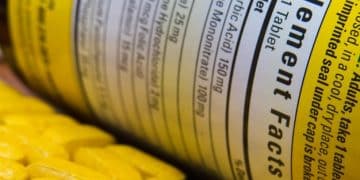Avoid These 5 Mistakes with Anti-Aging Supplements in 2025

Navigating the anti-aging supplement market can be complex, and to ensure efficacy and safety in 2025, consumers must avoid common pitfalls such as misinterpreting scientific claims, self-diagnosing, and neglecting professional medical advice.
In the quest for a youthful glow and sustained vitality, the allure of anti-aging supplements is undeniable. However, the path to a more youthful you isn’t always straightforward. Understanding how to **avoid these 5 common mistakes when taking anti-aging supplements in 2025** can be the difference between wasted effort and genuine, measurable results.
Misinterpreting Scientific Claims: The Lure of ‘Miracle’ Cures
The anti-aging industry is a multi-billion dollar market, often fueled by enthusiastic marketing that can sometimes outpace scientific evidence. When considering supplements, it’s crucial to approach claims with a discerning eye. Many products tout “revolutionary” or “miracle” ingredients, but a closer look at the research often reveals a more nuanced picture. Understanding the difference between preliminary studies, in vitro results, and robust human clinical trials is paramount.
Many supplements are marketed based on studies conducted on cells (in vitro) or animals, which do not always translate directly to human efficacy or safety. A compound that shows promise in a petri dish might behave entirely differently within the complex human biological system. Furthermore, even human studies can vary widely in quality. Look for peer-reviewed research, transparent methodologies, and independent replication of results before buying into an extravagant claim.
Evaluating Research: What to Look For
Not all scientific studies hold the same weight. When you encounter a claim, asking critical questions can help you determine its validity. Is the study double-blind and placebo-controlled? What was the sample size? Who funded the research, and are there any potential conflicts of interest? These factors significantly influence the reliability of results.
- Peer-reviewed journals: Prioritize research published in reputable, peer-reviewed scientific journals.
- Human clinical trials: Give more weight to studies conducted on humans, especially randomized controlled trials.
- Independent verification: Look for multiple studies confirming the same findings, ideally from different research groups.
- Dosage and duration: Ensure the dosage used in studies matches what’s found in the supplement and consider the study’s duration.
It’s also important to note that many supplements focus on a single ingredient, while a holistic approach to anti-aging often involves a combination of factors, including diet, exercise, and lifestyle. Relying solely on a single supplement based on an isolated study can be misleading.
Ultimately, a healthy skepticism is your best ally. If a claim sounds too good to be true, it very likely is. Consult with healthcare professionals who can help you interpret scientific information accurately and guide you toward evidence-based solutions that align with your health goals.
Self-Diagnosing and Self-Prescribing: The Dangers of Going Solo
The internet has democratized access to health information, but it has also led to a significant increase in self-diagnosis and self-prescription. While empowering, this trend carries substantial risks, particularly concerning anti-aging supplements. Taking supplements without understanding your body’s specific needs, potential deficiencies, or existing medical conditions can lead to adverse effects, drug interactions, or simply a waste of money.
Many individuals identify a symptom they associate with aging, such as fatigue or skin changes, and then immediately seek specific supplements advertised to address that symptom. However, these symptoms can be indicative of underlying health issues that require a professional medical diagnosis and tailored treatment. A supplement, even a beneficial one, might mask a more serious problem, delaying necessary medical intervention.
The Risks of Uninformed Supplementation
Taking the wrong supplement or an incorrect dosage can have unintended consequences. For example, some vitamins and minerals can be toxic in high doses, while others can interact negatively with prescription medications. Even “natural” ingredients can be potent and affect various bodily systems. Without professional guidance, you might exacerbate existing conditions or create new ones.
- Masking serious conditions: Supplements might alleviate symptoms but delay diagnosis of underlying diseases.
- Drug interactions: Many supplements can interact with prescription medications, reducing their efficacy or increasing side effects.
- Over-supplementation/toxicity: Certain vitamins (like A, D, E, K) are fat-soluble and can accumulate to toxic levels.
- Financial waste: Investing in supplements your body doesn’t need is an avoidable expense.
Before starting any new supplement regimen, especially if you have pre-existing health conditions, are pregnant, breastfeeding, or taking other medications, a consultation with a doctor or a registered dietitian is non-negotiable. They can perform necessary tests, review your medical history, and provide personalized recommendations, ensuring your anti-aging efforts are safe and effective.

Remember, your healthcare provider is your best resource for navigating the complex world of health and wellness. Their expertise can help you make informed decisions that support your long-term health and anti-aging goals.
Ignoring Professional Medical Advice and Quality Control
In an era where health information is abundant, selectively listening to advice or disregarding professional medical guidance for anecdotal evidence found online is a critical mistake. Anti-aging supplements, while often presented as harmless, are not regulated with the same rigor as pharmaceuticals in many regions. This regulatory gap makes professional oversight and diligent quality control even more crucial.
Many consumers fall into the trap of believing that if a supplement is sold over-the-counter, it must be safe and effective. Unfortunately, this isn’t always the case. The lack of stringent pre-market approval means that products can enter the market with little to no proof of their contents, purity, or even their claimed benefits. Some products have been found to contain contaminants, undeclared ingredients, or significantly different dosages than what’s listed on the label.
Prioritizing Purity and Potency
When selecting anti-aging supplements, the manufacturer’s commitment to quality control is paramount. Look for brands that conduct third-party testing and adhere to Good Manufacturing Practices (GMP). These practices ensure that products are consistently produced and controlled according to quality standards appropriate to their intended use.
- Consult your doctor: Always discuss your supplement plans with a healthcare provider, especially if you have chronic conditions or take medication.
- Verify third-party testing: Look for seals or certifications from independent organizations that test for purity, potency, and contaminants.
- Check for GMP certification: Choose manufacturers who follow Good Manufacturing Practices (GMP) to ensure quality.
- Research brand reputation: Opt for established brands with a history of transparency and positive consumer feedback.
Ignoring the advice of your doctor in favor of unqualified opinions can lead to ineffective treatments, dangerous interactions, or even adverse health outcomes. Your doctor has access to your full medical history and can offer personalized guidance based on scientific evidence, not marketing hype. Empower yourself with knowledge, but always vet that information through a trusted medical professional.
Ultimately, a proactive approach to your health involves a partnership with your healthcare team. They can help you navigate the vast and sometimes confusing landscape of anti-aging supplements, ensuring you make choices that are both safe and genuinely beneficial for your unique physiological needs.
Expecting Instant Results and Neglecting Lifestyle Factors
One of the most common pitfalls in the anti-aging journey is the expectation of immediate, dramatic results from supplements alone. The marketing of anti-aging products often presents an image of rapid transformation, implicitly suggesting that a pill can magically erase years of wear and tear. This misconception can lead to disappointment, discontinuation of beneficial practices, and an over-reliance on supplements as a sole solution.
The reality is that biological processes, including aging and cellular repair, operate on a much longer timeline. Anti-aging effects, especially those stemming from cellular regeneration or collagen production, take time to manifest. Expecting to see significant changes within weeks is often unrealistic. True anti-aging is a marathon, not a sprint, requiring patience and consistency.
The Holistic Approach to Anti-Aging
Furthermore, anti-aging supplements are designed to complement a healthy lifestyle, not replace it. Many individuals make the mistake of assuming that taking a supplement absolves them of the need to maintain a balanced diet, exercise regularly, manage stress, and ensure adequate sleep. However, these foundational lifestyle factors play a far more significant role in how gracefully we age than any single supplement could.
- Patience is key: Understand that biological processes take time; measurable results from supplements often require months of consistent use.
- Dietary foundation: Prioritize a nutrient-rich diet abundant in fruits, vegetables, and lean proteins.
- Regular exercise: Incorporate consistent physical activity to boost circulation, muscle tone, and overall vitality.
- Stress management: Practice mindfulness, meditation, or other stress-reducing techniques.
- Quality sleep: Aim for 7-9 hours of restorative sleep each night for cellular repair and hormonal balance.
Neglecting these fundamental pillars of health while relying heavily on supplements is akin to trying to build a house on an unstable foundation. Supplements can amplify the benefits of a healthy lifestyle, but they cannot compensate for its absence.
Instead of seeking a quick fix, adopt a comprehensive approach to anti-aging. View supplements as one component of a broader strategy that prioritizes your overall well-being. This integrated perspective not only yields more sustainable and noticeable results but also fosters a healthier relationship with your body and your aging process.
Overlooking Ingredient Synergy and Bioavailability
When selecting anti-aging supplements, many consumers focus solely on the presence of a single, popular ingredient without considering how it interacts with other compounds or how effectively the body can actually absorb and utilize it. This oversight is a common mistake that can significantly reduce the efficacy of even the most promising supplements.
Ingredient synergy refers to how different compounds work together, often enhancing each other’s benefits or even mitigating potential side effects. For example, some antioxidants are more effective when combined, as they can “recharge” each other. Similarly, certain vitamins require co-factors for optimal absorption. Overlooking these interactions means you might be taking ingredients in isolation that would be far more potent in combination.
Understanding Bioavailability for Better Results
Bioavailability, on the other hand, describes the proportion of a nutrient or supplement that is absorbed and becomes available for use by the body. A supplement might contain a high dose of an ingredient, but if it’s in a form that the body struggles to absorb, much of it will simply be excreted, rendering the product less effective and making it a poor investment.

- Look for synergistic formulas: Choose supplements where ingredients are combined to enhance each other’s effects.
- Prioritize bioavailable forms: Research which forms of a nutrient are best absorbed (e.g., magnesium citrate vs. magnesium oxide).
- Consider absorption enhancers: Some supplements include ingredients like piperine (black pepper extract) to boost bioavailability.
- Mind nutrient interactions: Be aware that some nutrients can compete for absorption (e.g., high doses of zinc can inhibit copper absorption).
For instance, curcumin (from turmeric) is a powerful anti-inflammatory and antioxidant, but its bioavailability is generally low. Many effective curcumin supplements include piperine to significantly increase its absorption. Similarly, many forms of collagen have varying degrees of bioavailability; hydrolyzed collagen peptides are often preferred for their superior absorption.
Educating yourself on these aspects can transform your approach to supplementation. Instead of just picking a product based on a prominent ingredient, consider the formulation as a whole. A well-formulated supplement will account for both synergy and bioavailability, ensuring that the active ingredients are not only present but also effectively delivered to where they are needed most in your body.
This deeper understanding empowers you to select supplements that offer genuine value and contribute meaningfully to your anti-aging goals, moving beyond mere marketing claims to scientific formulation.
| Key Mistake | Brief Description |
|---|---|
| 🔬 Misinterpreting Claims | Believing marketing hype over verified scientific evidence. |
| 🧍 Self-Diagnosing | Taking supplements without professional medical assessment. |
| 🧑⚕️ Ignoring Pro Advice | Disregarding doctor’s guidance and quality control for products. |
| ⏱️ Expecting Instant Results | Failing to understand the long-term nature of anti-aging processes. |
Frequently Asked Questions About Anti-Aging Supplements
Effectiveness varies by individual and scientific evidence. Common well-researched ingredients include Collagen Peptides for skin elasticity, NMN/Resveratrol for cellular health, and specific antioxidants like Vitamin C and E. However, efficacy is always best considered in the context of one’s overall health and doctor’s advice.
Results are not immediate and often require consistent use over several weeks to months. The timeline depends on the supplement, individual metabolism, and the specific aging concerns being addressed. Patience and adherence to recommended dosages are crucial for observable changes.
Yes, many supplements can interact with prescription and over-the-counter medications, potentially altering their effects or causing adverse reactions. It is critically important to consult your healthcare provider or pharmacist about all supplements you are considering, especially if you are on any medication.
The term “natural” does not automatically equate to “safe.” Many natural ingredients can be potent and have significant physiological effects or interactions. Purity, dosage, and individual sensitivities all play a role. Always research ingredients and discuss with a healthcare professional before use.
Lifestyle factors like diet, exercise, sleep, and stress management are foundational to healthy aging. Anti-aging supplements are designed to complement, not replace, these essential habits. A holistic approach that integrates supplements with a healthy lifestyle will yield the most comprehensive and sustainable anti-aging benefits.
Conclusion
Navigating the complex landscape of anti-aging supplements in 2025 demands a strategic and informed approach. By conscientiously avoiding common pitfalls such as misinterpreting scientific claims, self-diagnosing, neglecting professional medical advice, expecting instant results, and overlooking ingredient synergy and bioavailability, individuals can transform their journey. The pursuit of vitality should be grounded in evidence, personalized guidance, and a holistic understanding that integrates supplements as part of a broader commitment to health and well-being. Empower yourself with knowledge, collaborate with healthcare professionals, and cultivate patience, ensuring your anti-aging efforts are both safe and genuinely effective.





